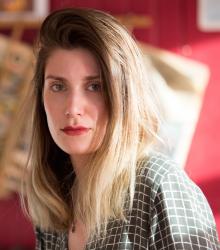Folk music is defined as music of the common people, which, in this day and age, is essentially all music…other than Queen Bey of course. This is why folk music is so difficult to describe, because its original definition has no relevance anymore. Nowadays ‘folk’ tends to refer to music that harks back to times when commoners would gather to share poetry, play musical instruments and sing. Iceland, in particular, has a strong connection with this kind of music. On long, cold nights, when there was little to do, gathering as a community and playing music was a way to keep the winter blues away.
This Icelandic connection to folk music was keenly felt throughout the festival. The majority of the acts on show performed in Icelandic, and related directly to Icelandic identity, from the snowy wilderness, to LGBTQ rights. In addition to this, the atmosphere of the festival itself, with communal benches surrounded by candles, created a cosy congregation snuggled up in unison. We could have been sat in a turf house in the middle of nowhere weathering a storm together.
The image I have of these gatherings from hundreds of years ago includes people of all ages, collaborating together. This image was reflected in the festival. From Ösp Eldjárn who invited her parents on stage to sing with her, and KÒRUS joining Marteinn Sindri by surprisingly bursting into song from the back of the room, to the whopping sixty year age gap between the youngest and oldest performers: a collective and inclusive representation of society.

Ösp Eldjárn getting a helping hand from Mum and Dad
There was a lot of talent at this festival and, in my opinion, the women shone the brightest. One of the highlights for me was RuGl. A duo of fifteen year olds, they absolutely killed it. Their performance was beautiful, mesmerising and—a true testament to their maturity—perfectly polished: there was not a bum note to be heard. Honestly, had they not mentioned that one of their songs was written as a “project for school”; you wouldn’t have guessed their age. These girls are certainly a band to watch out for.

RuGl
On the other side of the coin was the heart-warming Helena Eyjólfs who, at 75 years old, had the energy of someone half her age. Even after 40 years away from the stage, she simply lit up the room. She clearly has a special place in the hearts of many Icelanders, with most of the room singing along to her well-known songs.

Folk veteran Helena Eyjólfs
Another favourite of mine were Hljómsveitin Eva. They are a female duo that brought a feminist vibe into the mix. With songs about independent women and menstrual blood, interspersed with humorous banter, they were a delight to watch. The following night opened with Umbra Ensemble, who performed songs dating back a thousand years, creating ancient, dream-like, ethereal sounds, transporting us through time and space with their music.

Hljómsveitin Eva
After attending Sónar festival a few weeks ago, it was refreshing to see live music played without a single laptop in sight; I think I’d begun to forget real-life instruments existed. Folk music has such a vibrant history in Iceland, and it seems like its popularity isn’t waning anytime soon. The inclusivity, sense of community and collaboration was something unique that you just don’t see at other music festivals. Folk music is here to stay, and I for one welcome its cosy embrace.

Umbra Ensemble
Until next year—that’s all folks!
Buy subscriptions, t-shirts and more from our shop right here!
















